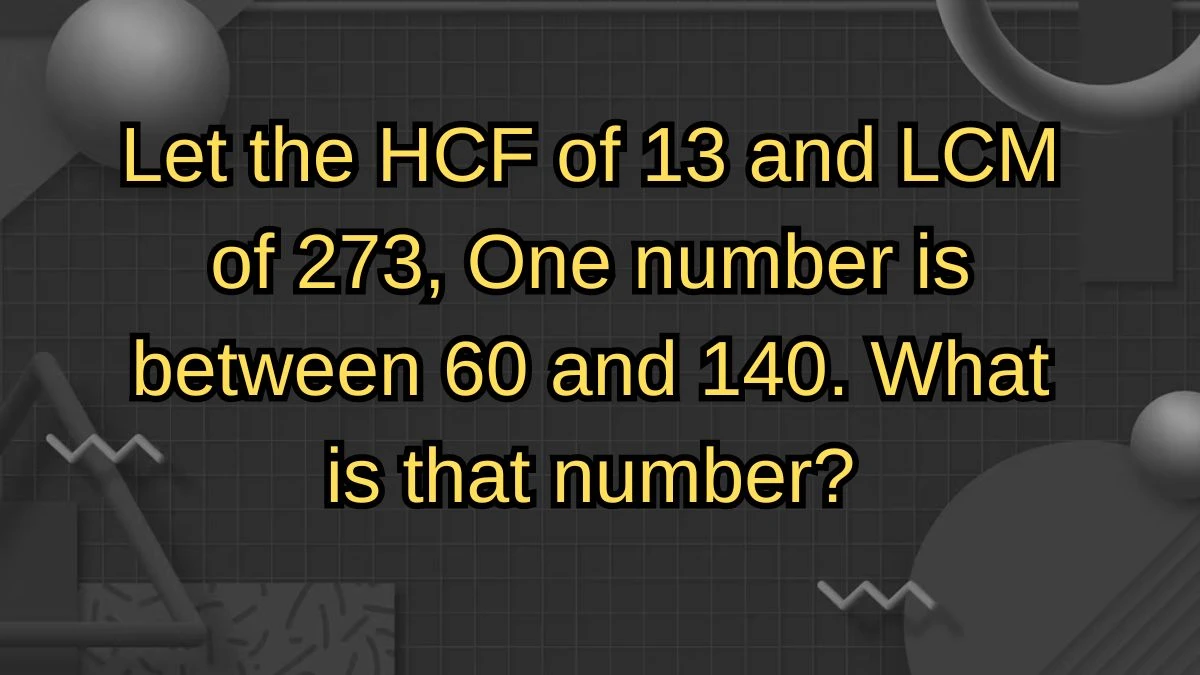Let the HCF of 13 and LCM of 273, One number is between 60 and 140. What is that number?
by
Updated Jul 25, 2024

Let the HCF of 13 and LCM of 273, One number is between 60 and 140. What is that number?
In mathematics, we often encounter problems where we need to find one of the two numbers given their highest common factor (HCF) and least common multiple (LCM).
The HCF of two numbers is 13.
The LCM of the same two numbers is 273.
One of the numbers is between 60 and 140.
We need to find the number that lies within this range
The product of the two numbers is equal to the product of their HCF and LCM. This is a key property in number theory.
Let the two numbers be p and q.
Using the property mentioned,
p x q = HCF x LCM
Substituting the given values,
p x q = 13 x 273
13 x 273 = 13 x 13 x 21
Simplify the factors: 13 x 13 x 3 x 7
We need to find pairs of factors that multiply to 13 x 273 and check which pair has one number between 60 and 140.
Possible pairs of factors
13 x (13 x 3 x 7) = 13 x 273
13 x 7 x 3 = 91 x 39
13 x 21 = 273
Continue evaluating these to find which one fits our criteria
The number must be between 60 and 140.
13 x 7 = 91 (within the range)
Out of the factors, 91 fits as it lies between 60 and 140
The number that falls between 60 and 140 and fits the given conditions is 91.
How to Find numbers using HCF and LCM?
In mathematics, the concepts of the Highest Common Factor (HCF) and Least Common Multiple (LCM) are essential tools for solving problems involving numbers. These concepts are particularly useful when determining unknown numbers under specific conditions.
HCF (Highest Common Factor):
The HCF of two numbers is the largest number that divides both of them without leaving a remainder. It helps to find the greatest common divisor of the given numbers.
LCM (Least Common Multiple):
The LCM of two numbers is the smallest number that is a multiple of both. It is useful in finding the least common multiples, which can help in aligning cycles or periods.
Finding an Unknown Number:
When given the HCF and LCM of two numbers and some conditions about the range of one number, you can use these values to determine the unknown numbers. The relationship between the HCF, LCM, and the product of the two numbers is key
Product of the numbers = HCF x LCM
Simplifying Complex Problems:
These concepts can simplify problems involving divisibility and multiples. For instance, they can help in scenarios where you need to find common periods in scheduling or align repetitive events.
Verifying Number Pairs:
When you break down the product of the HCF and LCM, you can verify potential pairs of numbers to see which ones fit the given conditions, such as a specified range.
Applications:
- HCF and LCM are fundamental in understanding the properties of numbers. They assist in breaking down numbers into their prime factors and finding common divisors.
- Knowing how to use HCF and LCM enhances problem-solving skills. It allows for the systematic approach to finding solutions to number-related problems.
- These mathematical tools are not just theoretical but have practical applications in everyday life. For example, they are used in solving problems related to time schedules, resource allocation, and more.




